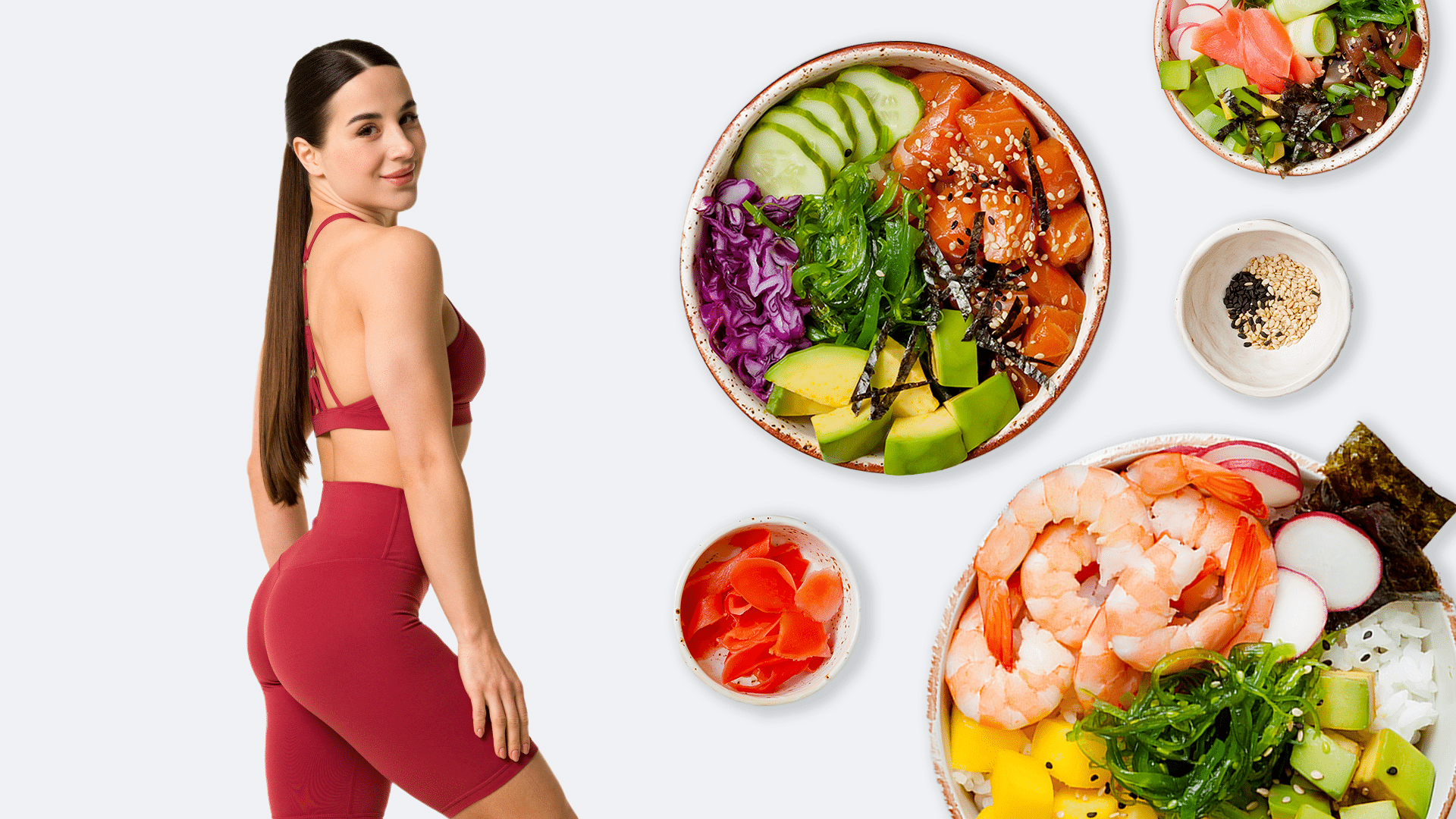Fasting is the practice of abstaining from food or drink or both and it has existed in society for centuries. Whether for health, ritualistic, religious, or ethical purposes, people all over the world choose to fast for different lengths of time.
In recent years in the health and fitness community, intermittent fasting has gained popularity as it has been suggested to help with weight management, while also having some health benefits.
To follow intermittent fasting well and reap its benefits, you must ensure that during the fasting window, you don’t end up consuming anything that may break your fast. But which foods or drinks can end up breaking a fast?
Read on to find out what you can and cannot eat or drink while fasting, the best things to eat immediately after breaking a fast, and much more.
What Is Intermittent Fasting?
Intermittent fasting is a type of eating plan that cycles between voluntary fasting periods (the fasting window) and non-fasting periods (an eating window). Unlike other popular eating plans, intermittent fasting (IF) does not dictate what you can or cannot eat.
Instead, IF only dictates when you should eat – basically you eat according to a set schedule. Intermittent fasting comes in various forms that anyone who is looking to get into such a plan can choose from. The most popular forms include:
The 16:8 method
This is perhaps the most well-known of all the IF plans. When following this method, you fast for 16 hours a day, which leaves you with an 8-hour eating window.
The most common way of doing the 16:8 is skipping breakfast and having your 1st meal at 12 pm. From here, you can eat as you please until 8 pm when the eating window closes until 12 pm the next day.
For those who feel that fasting 16 hours a day is a bit much, they could choose the 14:10 or 12:12 which still let you practice IF but decrease the fasting window and increase the eating window.
The 5:2 diet
Unlike the method above where you fast for a couple of hours each day of the week with no breaks, with the 5:2 diet, you only fast twice a week and eat normally on the other 5 days.
During the 2 (non-consecutive) fasting days, men and women typically limit their calorie intake to 600 kcals and 500 kcals, respectively.
Betterme will keep you laser-focused on your weight loss journey! Nutrient-packed meal plans, fat-blasting workouts, galvanizing challenges and much more. Try using the app and see for yourself!
Alternate day fasting (ADF)
Some people tend to confuse alternate day fasting with the 5:2 diet, but the two are not the same. With the latter, you only fast for 2 non-consecutive days a week, while with the former, you fast every other day.
An example of this is:
- Monday – Eat normally and as you wish
- Tuesday – Fast and only consume 500 calories or if you count calories, just 25% of your daily calorie intake (6)
- Wednesday – Eat as you wish
- Thursday – Fast and only consume 500 calories or if you count calories, just 25% of your daily calorie intake
- Friday – Eat as you wish
- Saturday – Fast and only consume 500 calories or if you count calories, just 25% of your daily calorie intake
- Sunday – Eat as you wish
The cycle continues until you decide to stop.
One-meal-a-day diet
Also known as OMAD or the warrior diet, this involves fasting for 20 hours a day and only allowing yourself a 4-hour window – usually at night – to get all your recommended daily calories. Some even take it further to a 1-hour eating window. Due to how extreme this diet is, it’s best for beginners to avoid it.
However, if you’ve tried all the above-listed IF methods and want to try something new and perhaps challenge yourself, then the one-meal-a-day diet may just be the thing for you.
Eat-Stop-Eat diet
This is another expert-level form of intermittent fasting. On the eat-stop-eat diet, participants go a full 24 hours without eating anything.
For example, you stop eating one day at dinner time and don’t eat anything until the next day at dinner. After the fasting period ends, you go back to eating normally.
Proponents of IF claim that this eating and fasting cycle has numerous health benefits and can help with weight loss.
A review published in 2023 suggested that intermittent fasting can help with weight management and body composition, while also offering improvements in glucose homeostasis and lipid profiles, and anti-inflammatory effects – potentially reducing the risk of cardiovascular and chronic illnesses (2).
How Do You Break a Fast Properly?
Is breaking a fast with yogurt a good thing or will it cause unwanted side effects? Can you do it with fruit or protein? Here’s all you need to know.
If you’re following the daily time-restricted versions of the IF diet – i.e. 16:8, 14:10, or 12:12, there really isn’t anything you can do wrong when breaking a fast. However, on the 5:2 diet, alternate day fasting, and the eat-stop-eat diet, you may find that certain foods or heavy meals when breaking your fast lead to discomfort or indigestion.
To be on the safe side, here is a list of some foods to break intermittent fasting:
Fermented foods
Yes, breaking a fast with yogurt is absolutely acceptable. Fermented foods and drinks such as yogurt, pickled vegetables, sauerkraut, kimchi, and unsweetened kefir help introduce good bacteria in your gut, which helps with digestion (4).
Fruits
Breaking a fast with fruit is another great way to open your feeding window. Not only are fruits rich in antioxidants and fiber, they also don’t require a lot of energy to process, which is great for the digestive system.
Fruits are also fantastic to include in your diet to reduce your risk of chronic illness and metabolic syndrome (9, 8). Opt for fruits with high water content such as berries (strawberries or blackberries), oranges, pineapples, watermelon, and oranges.
Broths and soups
There’s a reason why sick people often get served either of these two things. Nothing is easier on the digestive system than broth or soup.
While they can be used to break all methods of intermittent fasting, we highly recommend them for those who are doing the 5:2 diet, alternate day fasting, and the eat-stop-eat diet. It’s sometimes good to give your digestive system something easily digestible after a fast before introducing solid foods.
Read more: Green Tea Intermittent Fasting: Benefits and Side Effects
Leafy greens and other cooked non-starchy vegetables
They are generally low in calories and high in vitamins, minerals, and fiber, which can help ease the body back into eating while providing essential nutrients (3).
Vegetable and fruit juices and protein smoothies
As with broth or soups, they’re easily digestible, which means they won’t overwhelm the digestive system. They’re also rich in concentrated sources of vitamins, minerals, and antioxidants, which are fantastic for your overall well-being.
Please note that a higher intake of fruit and vegetables has been linked with a reduced risk of metabolic syndrome (1). If you choose to consume fruit or vegetable juices, be sure to choose blending over juicing. Although eating whole fruits and vegetables is ideal, blending is preferable to juicing as it keeps the fiber in the form of pulp, which is usually strained out of juices.
Poultry and lean meats
While this may not be the first thing you reach for after longer fasts, breaking a fast with protein after shorter IF fasts is perfectly fine. Protein provides the body with energy that has been depleted through fasting as well as vitamins, and minerals.
Healthy fats from seeds (chia pudding anyone?), eggs, avocados, etc.
BetterMe app will kick you out of the mental funk, shake off your extra weight, rid you off your energy-zapping habits, and help you sculpt the body of your dreams. Intrigued? Hurry up and change your life for the better!
Which Are the Best Liquids to Drink While Fasting?
IF allows you to have something to drink during the fasting window. However, not all drinks are allowed. The only permitted drinks you can have during the fasting window are:
- Plain water – Water is a great appetite suppressant that will help control hunger while fasting.
Adding vegetables and fruit to water to make it taste better has become quite the trend. However, you shouldn’t do this while on IF as it will add calories to your water, which might break your fast.
- Unsweetened tea and black coffee – Sugar and milk both have calories and will break your fast.
Foods to Avoid When Breaking a Fast
As explained above, the best foods to break a fast are those that don’t overly tax your digestive system. Below is a list of foods that are NOT a good choice for breaking your fast:
- Raw vegetables – Cooked vegetables are easier on the stomach than raw ones.
- Alcohol and caffeinated beverages
- Fried foods
- Foods that are problematic for you personally
- Too large or heavy a meal may cause indigestion or discomfort for some people after a longer fast
What Are the Best Foods to Eat After Fasting?
Once you’ve broken your fast with any of the foods listed in the ‘how to break a fast properly’ section above, feel free to eat as you normally would. The good thing about IF is it doesn’t limit what you can and can’t eat.
However, it’s best to stick to healthy, balanced meals if you want to achieve your goals. Instead of indulging in a lot of junk foods, sugary drinks, fried foods, and unhealthy snacks, try creating balanced meals from healthier options.
Lean animal proteins and plant proteins, healthy fats, whole grains, and lots of fruits and vegetables should make up the majority of foods you consume during your eating window (7). Make sure you also stay hydrated with water – not soda and other sugary drinks.
Read more: An 18-Hour Fast May Be Just Be What Your Body Needs for Optimal Health
FAQs
Does 50 calories break a fast?
Yes, it possibly does. While some sources and experts say that consuming anything between 50 and 75 calories during the fasting window won’t break your fast, there’s no explicit scientific evidence that corroborates any specific claims.
Instead of risking it, stick to zero calories by consuming the recommended plain water, black coffee, and unsweetened teas during this period.
Are eggs good for breaking a fast?
Yes, they are. Not only are they rich in protein, healthy fats, and a nutritional powerhouse, they’re also easy for the digestive system to tolerate and are unlikely to make your stomach hurt.
How can you gain weight with a fast metabolism?
Depending on your body goals, having a “fast” metabolism can be a blessing or a curse. For those who want to lose weight, a faster metabolic rate is a blessing that helps them burn calories faster, ensuring that extra energy isn’t turned into fat stores in the body.
However, for anyone who is underweight and wants to gain weight, a faster metabolism is something of a curse as it can prevent you from gaining weight as you desire. Thankfully, all hope is not lost. Some tips that can help you gain weight with a fast metabolism include:
- Eat at a caloric surplus – Consuming more energy than your body burns a day will lead to weight gain.
- Eat more frequently – Not only will this help with your choice to eat a calorie surplus, you may also find out that you’ve been undereating all along and that’s why you’re underweight
- Build muscle – Weight gain doesn’t always have to be extra fat; increased muscle will increase the number on the scale and help sculpt your body. Muscle is best built through weightlifting/strength training.
- Limit cardio – We don’t mean to ignore cardio completely. These workouts are essential for heart, lung, and general health. Instead, you should reduce the frequency or duration of cardio workouts and replace this with weightlifting.
- Eat healthily – This means choosing nutrient-dense foods such as whole grains, healthy fats, lean protein, and lots of fruits and vegetables to create balanced meals.
- Focus on protein – It is incredible for muscle building, which as we’ve mentioned above, will help you gain weight.
Is a 3-day fruit weight loss diet good?
No, it isn’t. Also known as a 3-day fruit cleanse, it’s a fad diet that promises weight loss and a healthy gut, but doesn’t deliver.
Yes, fruits are good for you and an essential part of a weight loss diet, but only eating raw fruits or fruit juices is an unhealthy and unsustainable way to lose weight. All you’ll lose is water weight and possibly some muscle mass, but not fat.
The Bottom Line
Breaking a fast requires as much of a special effort and focus on time as when you start it. It’s important to be careful and attentive to your body. You should choose what foods to eat during your first non-fasting meal carefully so as to avoid any unwanted side effects. Remember that you can always adjust your fast depending on your own limitations.
Fasting can be challenging for dieters as it’s important to take care of your body. Make it a rule to consult a healthcare provider before you start this journey. In this way, you’ll avoid any potential risks to your health and achieve your fitness goals much sooner. Take care and appreciate yourself.
DISCLAIMER:
This article is intended for general informational purposes only and does not serve to address individual circumstances. It is not a substitute for professional advice or help and should not be relied on for making any kind of decision-making. Any action taken as a direct or indirect result of the information in this article is entirely at your own risk and is your sole responsibility.
BetterMe, its content staff, and its medical advisors accept no responsibility for inaccuracies, errors, misstatements, inconsistencies, or omissions and specifically disclaim any liability, loss or risk, personal, professional or otherwise, which may be incurred as a consequence, directly or indirectly, of the use and/or application of any content.
You should always seek the advice of your physician or other qualified health provider with any questions you may have regarding a medical condition or your specific situation. Never disregard professional medical advice or delay seeking it because of BetterMe content. If you suspect or think you may have a medical emergency, call your doctor.
SOURCES:
- Associations of starchy and non-starchy vegetables with risk of metabolic syndrome: evidence from the NHANES 1999–2018 (2023, ncbi.nlm.nih.gov)
- Beneficial effects of intermittent fasting: a narrative review (2023, ncbi.nlm.nih.gov)
- Dark Green Leafy Vegetables (2023, ars.usda.gov)
- Fermented Foods, Health and the Gut Microbiome (2022, ncbi.nlm.nih.gov)
- Health Benefits of Nut Consumption (2010, ncbi.nlm.nih.gov)
- Health Effects of Alternate-Day Fasting in Adults: A Systematic Review and Meta-Analysis (2020, ncbi.nlm.nih.gov)
- Intermittent fasting: The positive news continues (2021, health.harvard.edu)
- Vegetables and Fruits (n.d., hsph.harvard.edu)
- Whole Fruits and Fruit Fiber Emerging Health Effects (2018, ncbi.nlm.nih.gov)










